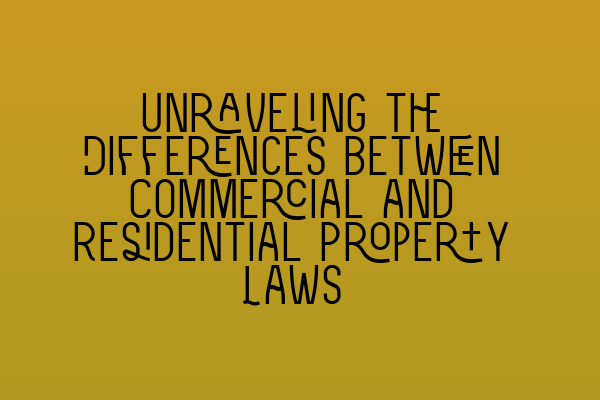**Title: Unraveling the Differences between Commercial and Residential Property Laws**
Introduction:
As a property owner, tenant, or aspiring investor, understanding the legal intricacies of property law is essential. However, the laws that govern commercial and residential properties differ significantly. In this blog post, we will unravel the differences between commercial and residential property laws, helping you navigate these distinct legal landscapes. So, whether you’re looking to buy a residential property or lease a commercial space, this article aims to provide you with valuable insights.
Commercial Property Laws:
Commercial property laws pertain to properties used for business purposes. This includes office spaces, shops, warehouses, and industrial units. Notably, commercial leases are subject to more extensive negotiations, as there is usually more at stake for both parties involved. Landlords and tenants must carefully consider lease terms, such as rent, security deposits, lease length, and maintenance responsibilities. Understanding common commercial property lease clauses, such as use restrictions and assignment provisions, is crucial to avoid legal complications and ensure a smooth tenancy. If you’re studying for your SQE exams, practicing with SQE 1 Practice Exam Questions or SQE 1 Practice Mocks FLK1 FLK2 can help solidify your knowledge in this area.
Residential Property Laws:
Residential property laws govern properties where individuals reside. This category encompasses houses, apartments, and rental units. Residential leases are typically more straightforward, with standardized clauses and regulations that prioritize the welfare of tenants. Landlords must adhere to various legal requirements, including providing habitable living conditions, abiding by rent control ordinances, and giving proper notice before entering a tenant’s premises. On the other hand, tenants have their own obligations, such as paying rent on time and not causing excessive damage to the property. Understanding the rights and responsibilities of both landlords and tenants is crucial for a harmonious residential tenancy. If you’re preparing for your SQE exams, signing up for SQE 1 Preparation Courses can enhance your understanding of residential property laws.
Key Differences:
1. Contractual Relationships: Commercial property leases are typically negotiated between knowledgeable parties, whereas residential leases involve more consumer-centric regulations to protect tenants.
2. Lease Terms: Commercial leases tend to be longer, often spanning several years, while residential leases are typically shorter, ranging from month-to-month to a year.
3. Rent Control and Price Regulation: Residential properties may be subject to rent control laws, limiting the landlord’s ability to increase rents drastically. In contrast, commercial rents are subject to market forces and negotiation.
4. Use Restrictions: Commercial properties may have specific use restrictions, dictating the type of business that can operate within the premises. Such restrictions are rare in residential properties.
5. Eviction Process: Evicting a commercial tenant involves a more complex legal process, potentially involving arbitration or litigation. Residential eviction follows specific legal procedures designed to protect the rights of tenants.
Conclusion:
Understanding the distinctions between commercial and residential property laws is crucial for property owners, tenants, and legal professionals alike. By being aware of these key differences, you can navigate the complexities of property law more effectively, avoid legal disputes, and protect your rights and interests. Whether you’re preparing for your SQE exams or simply seeking knowledge, continuously expanding your understanding of property law can lead to success. Don’t forget to refer to SQE 1 Preparation Courses and SRA SQE Exam Dates to stay updated with the latest study resources and examination schedules.
